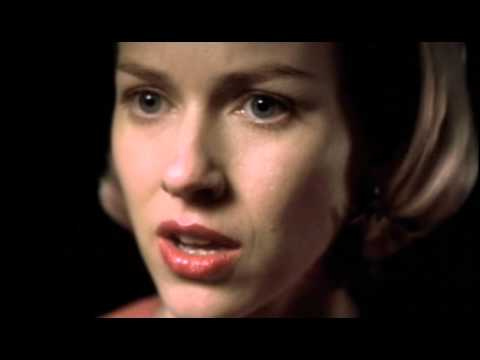I was all set to do a different film for this week’s Physical Media Appreciation Project, but then David Lynch passed away.
I’d been thinking a lot about David Lynch lately. The Blank Check podcast did a miniseries on his films at the end of 2024, and the This Had Oscar Buzz podcast recently did a Patreon episode on Mulholland Drive. In addition, both Mulholland Drive and Lost Highway are touchstones for …And Then She Laughed (the short film I wrote and directed, currently knee-deep in the editing process).
How to describe Mulholland Drive? Well, it follows a young starlet (played by Naomi Watts), fresh off the bus as she tries to make it in Los Angeles. Along the way, she falls in love with another actress (played by Laura Harring), and then things…take a turn.
I’d like to say that I was cool enough to appreciate Lynch from a young age, but aside from a few random episodes of Twin Peaks, I didn’t see any of his work until college. Mulholland Drive was my first true Lynch experience, and, to be honest, I was a real square about it. In my defense, it was the early ‘00s, and I was feeling salty about all the male directors who I saw as exploiting two women kissing for the titillation of their male audience. Can I think of an example for you now? Not really. I have vague memories of actresses like Shannon Elizabeth, low-rise jeans, and snickering teenage boys. Am I just describing the American Pie movies? Maybe. General, high-school, American Pie adjacent movies.
Anyway, I was salty about that and not sophisticated enough to separate trash from trashterpiece (Wild Things) from masterpiece (Mulholland Drive). The fact that I couldn’t get a handle on the plot of Mulholland Drive only exacerbated my frustration. At the same time, I was experiencing one of the most astonishing performances (Naomi Watts) I’ve ever seen put to screen, as well as feeling horribly on edge - wanting to crawl out of my skin on edge - because Mulholland Drive contains three of my all-time scariest moments in film. To put it mildly, I was confused, unsettled, and annoyed. But of course this is not a fruitful way to watch any Lynch film, much less Mulholland Drive.
Flash forward a few years later - I’m in grad school and about to have my reintroduction to David Lynch. It’s pushing 3am and I’m flipping randomly through the channels when I come across images of a young boy pulling a person out of some kind of mound of dirt and flesh and roots(?). I didn’t realize it at the time, but I was watching Lynch’s short film, The Grandmother. And I was transfixed. Sleepless at 3am really does feel like the perfect time to ingest some Lynch because your sleep-deprived mind isn’t so hung up on making logical connections, and can more fully embrace the dream-like, surreal nature of the Lynch experience.
The very next semester, as I’ve previously mentioned, I took a film class on Lynch and Cronenberg. I wish I could find my old papers and notes from that class to confirm, but to my recollection, it was focused on the idea of dream on film. So we watched Eraserhead, Blue Velvet, Wild at Heart, Lost Highway, and, obviously, Mulholland Drive (I think Inland Empire must have only just come out, or I imagine that would have been on the syllabus as well). It was amazing! I found that watching all his films in order and in quick succession helped me understand how to process them. Once you’ve accepted Eraserhead in all its surreal glory, and realize that dream logic supersedes, you can just let go and allow yourself to be carried along by the experience. At least, that’s what happened for me. By the time we got to Mulholland Drive, I was fully on the Lynch wavelength. Second time’s the charm!
If you haven’t seen Mulholland Drive, I don’t mean to scare you off with talk of dreams and surrealism. The film is not just a collection of bizarre, beautiful, haunting images, but has a real internal logic that you can put together into a coherent storyline if you wish. It’s also a culmination of sorts - a film that distills Lynch’s love and fascination with Los Angeles, the city of dreams, and, occasionally, nightmares, as well as continuing to twist and dissect the themes and structures of his previous works.
Stats: I have the Criterion Collection blu-ray, officially approved by David Lynch, which is full of interviews with cast and crew, on-set footage, etc.
The world is a poorer place with the passing of David Lynch. By all accounts, he was not only an artist of singular vision, but a kind man. Mulholland Drive, along with Lynch’s other films, made me recalibrate what I believed a movie could be. The stories of Lynch on set showed me the kind of director I wanted to be. In a world of auteurs, reveling in their own enfant terrible-ness, Lynch built a space of trust and safety where cast and crew could feel brave enough to explore the darkest parts of his vision and embrace the earnestness of emotion that gave all this darkness a sense of humanity.
I know 78 is a fairly robust old age, but it seems unfair that Lynch’s feature filmography is so small relatively speaking (ten feature films, plus Twin Peaks, compared to something like Spielberg’s thirty-five films, or Scorsese’s twenty-six not counting his documentaries). On the other hand, the existance of each of his films feels like a minor miracle, and we’re damn lucky to have ten. I could have watched 100 more. So farewell, David Lynch, one of the greatest to ever do it. I wish you’d had more time.



